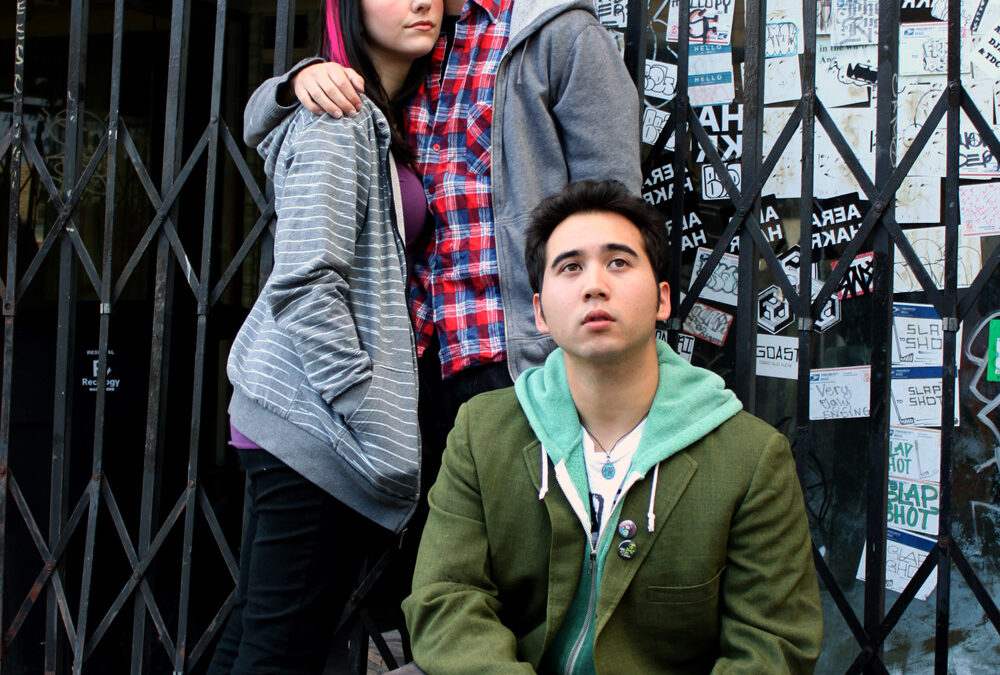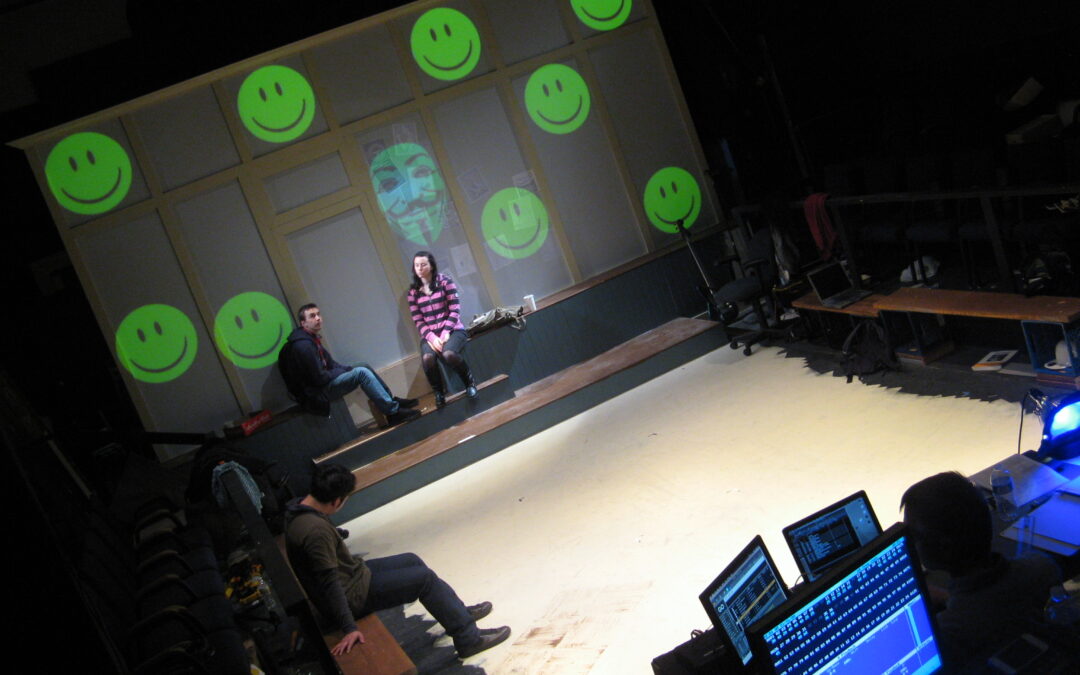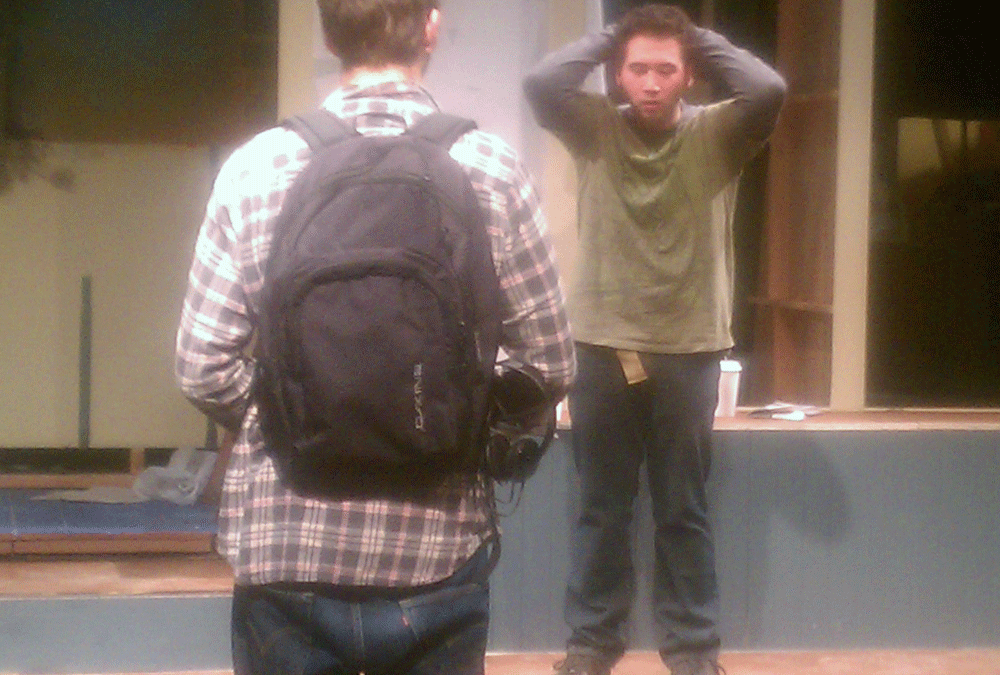
SFWeekly Featurette
nice write-up for Little Brother in the SF Weekly’s Voice Places
Read more at:
https://www.voiceplaces.com/little-brother-san-francisco-bay-area-2909873-e/

nice write-up for Little Brother in the SF Weekly’s Voice Places
Read more at:
https://www.voiceplaces.com/little-brother-san-francisco-bay-area-2909873-e/

Last night I saw the new projector in motion for the first time. Holy multi-media, batman. It’s really beautiful and exciting. It is going to make Little Brother as cool as it needs to be, as it is a show that depends on the audience understanding the technology in the book to get the most out of the story. This is not fluff, this is as
essential to the play as, let’s say, the costumes.
That is not always the case.
I looked up to our SM booth and saw three staff members (SM, ASM and video
engineer) clicking away furiously. Four more laptops were lighting the center
audience. At one moment there was a serious search for an open outlet. It reminded me of my first few apartments – way too many plugs, no where left to go.
Another flashback – CMTC’s first show in Boston. At the incredible Boston Center
for the Arts where we were able to rent cheap, and use their small, unheated
space. Our sound was on CDs, I think, but it could have been a tape player. Our
lights were basically their wash. I directed, and also performed on the light
board. I totally mean that, performed, as there was no X to Y switch, and I was
spending the 2-hour show desperately trying to hold steady and not twitch too
much when we had to go to the next cue. Sometimes I would flash a light if I felt
the show needed a little excitement. It was Stein’s Dr. Faustus Lights the Lights so
it seemed somewhat appropriate.
We’ve come a long way, baby. I guess. But on the other hand, at what cost?
Having this much power on stage is incredible, but it is also dangerous.
As I am thinking thru design choices for A Bright Room Called Day, which will
also use video, I am reminded that the storytelling has to come first. Everything
on the screen is gravy. People come to the theatre to see themselves in 3-D, in
real life, and because theatre is dangerous. One of my professors, Ray Munro,
says the only reason people go to the theatre is that someone can die. I totally
get that. And this technology, no matter how pretty, is already dead. It is canned.
It is, in some ways, the opposite of what we do.
Josh Costello, our incredible Little Brother director and adapter knows this. I
overheard a discussion where he wondered if one video moment was distracting
from the storytelling. The tech crew argued against it, first I think because of how
beautiful and cool it was, but then Josh reminded everyone that the actors on stage
have to be the focus. Always. That cue may remain in, or they might adjust, but I was
thrilled at the process that was examining THE WHY of all the computer magic we
can create, in a medium that in its essence is about two live humans, on stage,
bearing their souls for us.
No computer required for that. Just flesh and blood.
-bk

Little Brother, which opens Jan 17th, was named an editor’s pick in this month’s Theatre Bay Area Magazine. Caroline Anderson writes
Read more about the other great shows TBA picked on their website

I first read Cory Doctorow’s novel Little Brother in 2009. I loved it, and it wasn’t long before I started thinking about turning it into a play. It’s got all kinds of things I like to put on stage: young people fighting back against a corrupt system, a pinch of science fiction, a sweet yet strikingly honest teenage romance. There aren’t many stories that hit so many of my buttons all at once. I emailed Cory Doctorow that June, and he replied twelve minutes later, cc’ing his agent and saying he was open to the idea.
I spent the next several months banging out a first draft, then got the chance to hear it aloud at a couple of staged readings with SF Playhouse. That led to more rewrites, and eventually I brought the script to Brian Katz and he agreed to produce it with Custom Made.
In the year since then, I’ve continued working on the script even as events in the real world caught up with and threatened to move past what happens in the story. Neither the Arab Spring nor Occupy Wall Street are predicted in Little Brother, but it is impossible to look at Little Brother now without thinking about both of them. It has been said that Cory Doctorow predicts the present. When people use technology to come together in solidarity against vastly more powerful forces, and when our president signs a bill legalizing the indefinite detention without trial of American citizens, the kind of present that Cory Doctorow predicts in Little Brother looks more and more like right now.
I don’t know how many Cory Doctorow fans are also small theatre enthusiasts — that Venn Diagram might just be me — but I hope this production will resonate with both the fans and the folks who have never heard of Cory Doctorow. I hope the fans will forgive me for the changes I’ve made to the story. I made some pretty big changes, not because I think I know better than Cory — I’m at least as big a fan as you are — but because a play and a novel are different beasts. Cory clearly believes in remixing and retelling, and that’s exactly what this is.
I love this story. I love that it’s both epic and detailed, both serious and funny, both earnest and subversive. Working with a talented group of people to bring Little Brother to life has been tremendously fulfilling. I can’t think of any story I’d rather tell. Enjoy.

Last night we did something new at Custom Made: one of the perks of giving to our recent Indiegogo campaign was to be invited to the designer run.
For those not in the industry, or obsessed with obscure theatrical terminology, the designer run is one of the last chances for the design staff to see the play in action before the technical elements are brought in. The “audience” is filled with tired, but excited, staff and enough computers, fabrics, gels, pipe, as well as various snack products and coffees to keep an #Occupy camp going for a night.
It was a treat having six of our donors there for this unique experience, and also gave the actors their first opportunity to play in front of a fresh audience. The result was fantastic! The play seemed to land very well, laughs happened where they should, and despite this being a play with a massive multi-media component that had has not been loaded in yet (let alone most costumes, props, or a finished set) the audience was engaged, entertained, and said it left them with a lot to think about.
All in all, a remarkable evening, and one I am very proud we were able to acheive.
Here’s two photos from my cell phone. Sorry for the poor quality:

Here’s some shots from the recent video shoot in the Mission!